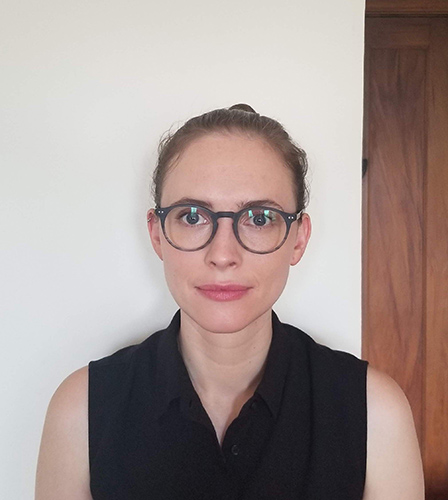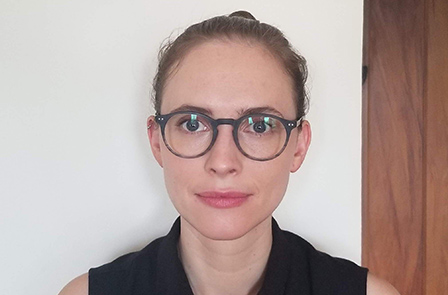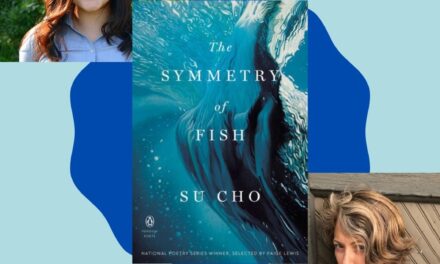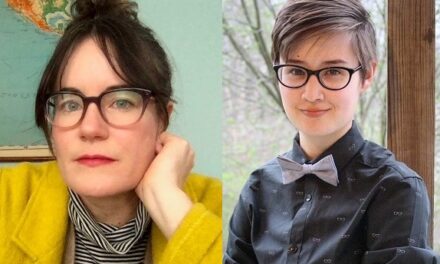
Assistant Managing Editor Bess Winter: A new academic year is upon us, which means we at The Cincinnati Review welcome new Assistant Editor Holli Carrell to our fold. Holli is an accomplished poet, cat lover, and outdoor adventurer. We’re excited for all the changes she’ll bring to CR this year and are delighted to introduce her to our readers.
Holli Carrell (she/her) is a writer, editor, and educator originally from Utah, now living in Cincinnati. Her poems can be found in 32 Poems, The Journal, Salt Hill, Bennington Review, and Poetry Northwest, among other places. She is a fourth-year PhD student at the University of Cincinnati.
BW: Tell us what you’re working on right now. Are you at work on a book-length project?
I’m at work on two book-length projects. The first is nearly finished and has been with me for a long time, evolving and growing beside me for about six or seven years. It’s about childhood religious indoctrination, Utah and the West, and gender performativity. The second is my creative dissertation, which is in its very early stages, so I have that writerly trepidation about discussing it too soon.
BW: On top of your PhD at UC, you’re also pursuing a certificate in Women’s and Gender Studies. How does this inform you as an artist and writer?
Much of my writing circles topics surrounding gender, sexuality, and bodily autonomy, and has done so from my earliest poems. One of the big draws for me in attending the creative writing PhD program at UC was the ability to take courses in the WGSS department while simultaneously studying poetics. I knew entering the program, too, that I wanted my doctoral exams to focus on feminist poetics of the nineteenth and twentieth centuries. I wanted a more robust theoretical background to study that field thoroughly and responsibly. My coursework in the WGSS department in feminist and queer theory, and transnational/decolonial feminisms, has made me a better reader, thinker, and teacher; it has definitely influenced my creative work, as well.
BW: You’ve lived in Utah and New York City, among other places. What is your life like in Cincinnati? Either your writing life or just your everyday life. What aspects of the city interest or annoy you, or both? How is it as a place to write and make art?
I moved to Cincinnati in July 2020, sight unseen because of the pandemic. At that time I had only lived in Utah and New York City; I’d never traveled through the Midwest and had no idea what to expect. After eight years in New York City I had some initial culture shock, but I feel truly fortunate to have landed here. Cincinnati is a wonderful place to write and live, with a rich literary heritage and vibrant writing community. We are spoiled with impeccably curated local bookstores, numerous reading series and open mics, fantastic local journals and zines, as well as outstanding libraries and writing organizations. I’m grateful for the community I’ve made here.
My daily life in Cincinnati is probably not that different from other PhD students. If it is a writing day, when I am not teaching or working on The Cincinnati Review, I wake up, drown myself in coffee, and then play with my cat, Janis. She is very particular about her routine and must be entertained first thing in the morning, or else she’ll mew under my desk while I write, and bite at my ankles. After writing and researching, I like to go to my community garden in the evenings. Gardening has become a new passion for me since moving to Cincinnati. I’m mostly a beginner, but I absolutely love it and appreciate the new creative outlet. I might also walk with my partner to the Esquire Theater to catch a movie, or we’ll go on a walk or hike nearby. Cincinnati has beautiful green spaces; autumn is stunning here. A perfect day wouldn’t be complete without Graeter’s ice cream or a pint at Arlin’s.
BW: What are you most looking forward to as part of your editorship with Cincinnati Review?
It’s hard to pick just one thing, but curating miCRo with my fellow graduate student editors is exciting. I can’t wait to read and encounter new creative work. The opportunity to work more directly with authors also feels very special.












I really enjoyed this interview. It was clear and to the point, yet it has you wanting to know more about both the interviewer and the interviewee. I am grateful to have received this in my inbox today and am looking forward to learning more.